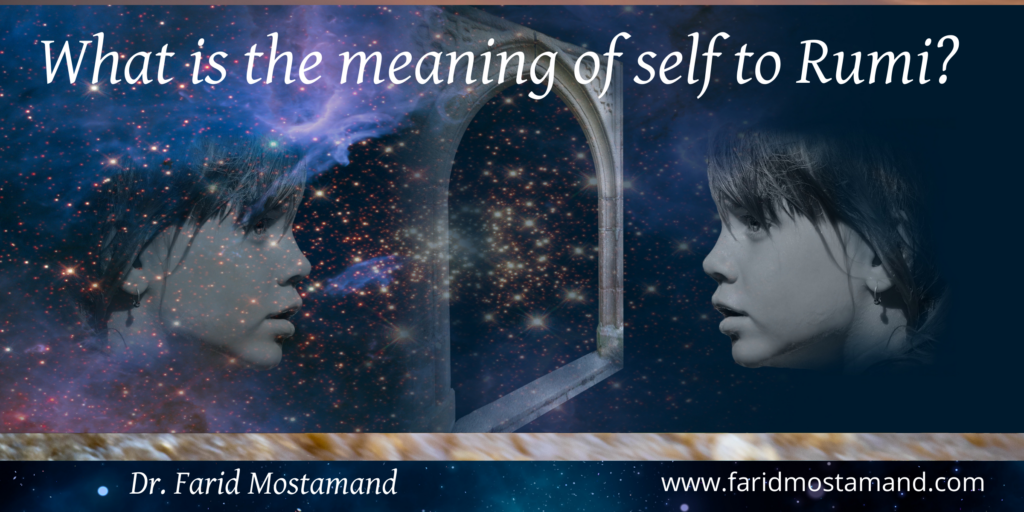
In Mathnawi, Rumi depicts the individual notion of self and the Self of God by telling the story of a lover who knocks on the door of his beloved. When asked “who it is?” The lover responds, “It is I”. The beloved did not open the door. Rumi explains that. You cannot know your (self) and God’s Self.
After the lover spent some time alone to unite with the source, he came back and knocked on the beloved’s door. This time when the beloved asked, “ who it is?” The lover responded, “it is you!”
In this tale, Rumi implies that since having attained the reunion with God, the sense of self had become encompassed within the Self of God.
Rumi is referring to self as something complex, multifaceted, and elusive. In this sense, the English term “self” is too broad for what we are dealing with when we examine the works of Rūmī for when he refers to the “self. The term Rumi often uses for self is Nafs.
In Rumi’s notion, Nafs can be a false identity that keeps us from experiencing our true, spiritual essence.
Therefore, when Rumi refers to the self, he is often referring to all four parts of the self.
1-Spirit
2-Soul
3-Body
4-Heart
Let us examine each part closely.
Spirit
Most of the time soul and spirit are used interchangeably, but they are not the same. Spirit is a part of universal intelligence(Source) that becomes a part of self with the first breath. It is a part of the whole(Universal Intelligence) that contains all elements of the whole.
This separated part of Universal intelligence becomes the main element of self. This part is infinite and does not change.
As the body disappears, the spirit rejoins the source which is unique to that self (you). If this part (spirit) is put into another body, it becomes the same self ( you) minus feeling, thought, desire, and Free well. This part of self also can be named based on our beliefs and upbringing. There are many names to this part of the self: Consciousness, True self, Divinity within, innate intelligence.
Rumi said, “My spirit is from elsewhere. I am sure of that, and I intend to end up there.”
Soul
Neuroscientists believe that the mind or the soul is a physical activity of the brain. So to the scientist, the Soul or mind is a manifestation of brain activity. But so far they have not presented any convincing scientific evidence to prove their theory. They have not identified any part of the brain that contains emotion or feeling, and they have not associated emotion and feeling with the firing of any neuron in the brain.
Rumi’s philosophy of the soul is complex. But in most of his poetry when Rumi talks about the soul, he refers to, Nafs (Carnal self). This is the part of the soul that can incite evil. Free will exist in this part of the self. As we mentioned Free will is not a part of the spirit because the spirit does not go through changes.
There is a life force within your soul. Seek that life.
There is gold in the mountain of your body. Seek that, mind.
O traveler, if you’re in search of that, don’t look outside.
Look inside yourself and seek that.
Body
The body is that part of self that contains the spirit. Rumi and Sufism believe that spirit separated from the source (Universal intelligence) and got into the body.
Heart
Rumi talks about the heart as the center of our soul. This nonphysical heart(Electromagnetic field of the heart) is where our feeling of love and ego exists.
Rumi does not talk about the heart as a biological pump. It is a field or metaphor for love and compassion.
Ishq or love is the essence of Rumi poetry. We cannot understand Rumi poetry without understanding what love is to Rumi: Love is the unity with beloved. Love is the foundation of Rumi’s believe and work. To Rumi Love, Is the only pathway to connect to the source, and our purpose in life is this unity with the beloved (source).